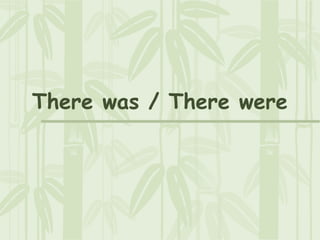More Related Content
More from MargaRenedo (20)
There was
- 2. There was / There were
• Son el pasado de “there
is” y “there are”.
• Significan “había” o
“hubo”.
- 3. There was / There were
• “There was” expresa que
había una cosa.
• Se usa con sustantivos
contables en singular y
con incontables.
- 4. There was / There were
• “There were” expresa
que había dos cosas o
más.
• Se usa con sustantivos
contables en plural.
- 5. There was / There were
• La forma negativa es:
“There wasn’t...” / “There
was not...”
“There weren’t...” / “There
were not...”
- 6. There was / There were
• La forma interrogativa
es:
“Was there...?”
“Were there...?”
- 7. There was / There were
• Las respuestas breves:
“Yes, there was.”
“No,there wasn’t.”
“Yes,there were.”
“No,there weren’t.”
- 8. Había un pub en el pueblo.
There was a pub in the village.
- 10. ¿Había un fantasma en el
pub? Si, lo había.
Was there a ghost in the pub?
Yes, there was.
- 11. ¿Había soldados en el
pueblo? No, no los había.
Were there any soldiers in the
village? No, there weren’t.
- 14. ¿Había comida en el pub?
Si, la había.
Was there any food in the
pub? Yes, there was.
- 16. No había un perro en la
casa
There wasn’t a dog in the
house.
